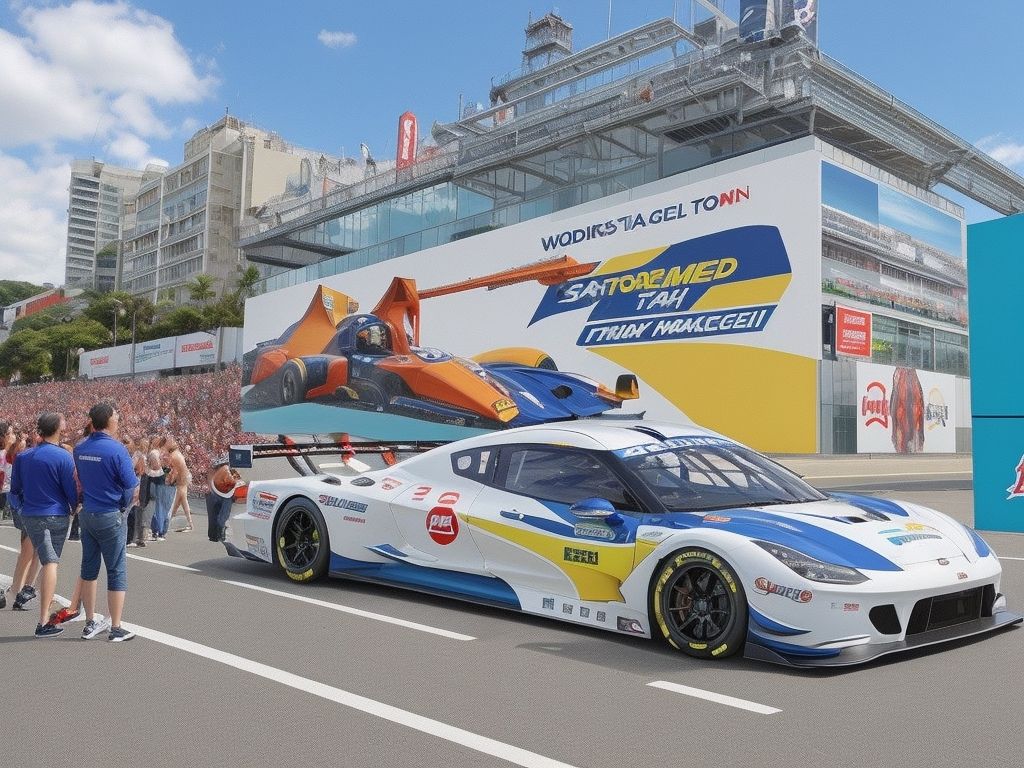Fast Track Marketing is a dynamic approach to marketing that aims to accelerate the growth and success of businesses. It involves implementing strategies and techniques that prioritize efficiency, rapid results, and cost-effectiveness. This method has gained popularity due to its ability to deliver effective outcomes in a shorter timeframe compared to traditional marketing methods.
One of the key benefits of Fast Track Marketing is increased efficiency. By streamlining processes and focusing on high-impact activities, businesses can optimize their resources and achieve maximum results in a shorter time period. This approach offers rapid results, allowing businesses to quickly generate leads, increase brand visibility, and drive sales. Fast Track Marketing is known for its cost-effectiveness, as it eliminates unnecessary expenses and focuses resources on strategies that deliver the most value.
To implement Fast Track Marketing effectively, businesses utilize various strategies. Targeted advertising campaigns ensure that promotional efforts reach the right audience, optimizing the chances of converting leads into sales. Social media platforms play a crucial role in this approach, as businesses leverage their wide reach and targeting capabilities to engage with potential customers. Personalized email marketing is another strategy used to establish direct communication with customers and nurture relationships.
While Fast Track Marketing offers numerous advantages, it also presents challenges and risks. Increased competition is one such challenge, as businesses strive to stand out amidst a crowded marketplace. There is a risk of overlooking long-term growth while focusing solely on short-term results. Potential customer overload can occur if businesses struggle to effectively manage an influx of leads and enquiries.
Several successful Fast Track Marketing campaigns serve as examples of how this approach can drive remarkable outcomes. Whether it’s a viral social media campaign, a targeted email marketing strategy, or a creative advertising campaign, these examples demonstrate the power of fast and efficient marketing methods.
To ensure effective Fast Track Marketing, businesses should follow some key tips. This includes setting clear goals and objectives, understanding the target audience, regularly analyzing and adapting strategies, and investing in technologies that facilitate rapid and effective marketing efforts.
Key takeaway:
- Fast Track Marketing maximizes efficiency: By utilizing targeted advertising campaigns, social media platforms, and personalized email marketing, businesses can achieve rapid and cost-effective results.
- Fast Track Marketing requires strategic implementation: To ensure success, businesses need to carefully plan and execute their fast track marketing strategies while considering long-term growth and potential customer overload.
- Successful Fast Track Marketing campaigns exist: Numerous examples demonstrate the effectiveness of fast track marketing, proving it to be a valuable strategy for businesses looking to achieve rapid results.
What is Fast Track Marketing?

Photo Credits: Runningtrackresurfacing.Uk by Justin Sanchez
Fast Track Marketing is a strategic approach that aims to expedite the process of bringing a product or service to market. It involves implementing aggressive and innovative marketing tactics to quickly gain market share and generate revenue. This approach is particularly effective in fast-paced industries or when there is intense competition.
One key aspect of Fast Track Marketing is the ability to quickly identify target customers and tailor marketing campaigns to appeal to their needs and preferences. By efficiently reaching and engaging the right audience, businesses can maximise their marketing efforts and achieve faster results.
Another important element of Fast Track Marketing is the use of data and analytics to drive decision-making. By gathering and analysing relevant data, businesses can identify trends, target specific customer segments, and optimise marketing strategies for maximum impact.
Fast Track Marketing also requires a proactive and agile mindset. It involves constantly monitoring market dynamics and adjusting marketing strategies accordingly. This enables businesses to stay ahead of the competition and effectively respond to changes in customer preferences or market conditions.
Fast Track Marketing is a dynamic and results-oriented approach that seeks to expedite the marketing process and achieve rapid success. By understanding the target market, leveraging data-driven insights, and maintaining agility, businesses can effectively implement Fast Track Marketing strategies and achieve their goals.
When a new tech startup called XYZ entered the market, they knew they needed to quickly establish their brand and attract customers. They implemented a Fast Track Marketing strategy that involved targeted online advertising and social media campaigns to reach their tech-savvy target audience.
By analysing data and tracking customer engagement, XYZ was able to identify the most effective channels and messaging to capture the attention of potential customers. They also utilised influencer marketing, collaborating with popular tech bloggers to endorse their products.
Within six months, XYZ had captured a significant market share and experienced exponential revenue growth. Their fast and proactive marketing approach had successfully positioned them as a leading player in the industry.
This true story demonstrates the power and effectiveness of Fast Track Marketing when implemented strategically and with a clear understanding of the target market.
Benefits of Fast Track Marketing

Photo Credits: Runningtrackresurfacing.Uk by Joseph Brown
Looking to enhance your marketing efforts? This section unveils the remarkable advantages of fast track marketing. Explore how it can enhance efficiency, bring about rapid results, and save valuable resources. Bid farewell to slow campaigns and embrace a dynamic approach that maximises your impact. Get ready as we dive into the thrilling realm of fast track marketing and its game-changing benefits.
Increased Efficiency
Increased efficiency is a crucial aspect of fast track marketing. By improving efficiency, companies can optimise their resources and achieve better results in shorter periods of time. Here are key elements that contribute to increased efficiency in fast track marketing:
- Streamlined processes: Fast track marketing focuses on eliminating unnecessary steps and streamlining processes. By identifying and removing bottlenecks, companies can expedite their marketing efforts, saving time and resources.
- Data-driven decision making: Leveraging data and analytics allows companies to make informed decisions, ensuring their marketing strategies are targeted and effective. By analysing customer data, companies can understand their target audience better and tailor their campaigns accordingly.
- Automation: Automation tools can help streamline repetitive and time-consuming tasks, freeing up valuable resources. By automating tasks such as email marketing, social media scheduling, and lead nurturing, companies can save time and focus on more strategic activities.
- Cross-functional collaboration: Fast track marketing encourages collaboration between different departments within a company. By breaking down silos and fostering communication, companies can ensure that everyone is aligned towards the same goals, leading to more efficient and effective marketing strategies.
- Continuous optimisation: Fast track marketing emphasises the importance of continuous learning and improvement. By monitoring and analysing campaign performance, companies can identify areas for optimisation and make adjustments to achieve better results.
Incorporating these elements into a fast track marketing approach can help companies achieve increased efficiency, enabling them to stay competitive and maximise their return on investment.
Rapid Results
Rapid results can be achieved in fast track marketing by following these steps:
- Identify specific goals and objectives for your marketing campaign. Determine what outcomes you want to achieve and set measurable targets.
- Create a detailed timeline and allocate resources accordingly. Break down the tasks and set deadlines to ensure timely execution.
- Utilise data-driven strategies to target the right audience. Conduct market research to understand customer preferences and behaviour.
- Develop compelling and impactful marketing messages. Craft persuasive content that resonates with your target audience and grabs their attention.
- Implement multi-channel marketing tactics. Utilise various marketing channels such as social media, email marketing, and targeted advertising campaigns to reach a wider audience.
- Monitor and analyse the performance of your marketing efforts in real-time. Track key metrics and make data-driven decisions to optimise your strategy.
- Continuously iterate and improve your marketing campaigns based on the insights gained. Stay updated with industry trends and adapt your approach accordingly.
By following these steps, you can achieve rapid results in your fast track marketing campaign and effectively drive your desired outcomes.
Cost-effectiveness
When considering the cost-effectiveness of fast track marketing, there are several key points to keep in mind:
- Optimized budget allocation: Fast track marketing allows for a more targeted approach, ensuring that your marketing budget is allocated towards the most effective strategies and channels. By focusing on the tactics that yield the best results, you can maximize the impact of your investment.
- Reduced wastage: With fast track marketing, you can avoid wasting resources on ineffective campaigns or strategies. By constantly monitoring and adjusting your marketing efforts, you can quickly identify what works and what doesn’t, allowing you to minimize unnecessary expenses.
- Increased ROI: By investing in fast track marketing, you can achieve rapid results and see a higher return on your investment. The streamlined approach enables you to drive more conversions and sales in a shorter period, boosting your overall revenue.
- Efficient resource utilization: Fast track marketing emphasizes efficiency and effectiveness. By employing targeted advertising campaigns, utilizing social media platforms, and implementing personalized email marketing, you can make the most of your available resources, ensuring that every effort contributes to achieving your marketing goals.
- Cost-efficient scaling: Fast track marketing allows for scalable growth without incurring significant additional expenses. As you identify successful strategies, you can replicate and expand upon them to reach a larger audience and generate more leads or sales, all while maintaining a cost-effective approach.
Ultimately, the goal of cost-effective fast track marketing is to optimize and maximize the impact of your marketing efforts while efficiently utilizing your available resources. By employing targeted strategies and constantly evaluating and adjusting your approach, you can achieve rapid results and drive a higher return on your investment.
How Does Fast Track Marketing Work?

Photo Credits: Runningtrackresurfacing.Uk by Mason Mitchell
Fast Track Marketing is a strategy used by businesses to expedite the marketing process and achieve quick results. This approach focuses on maximising efficiency and accelerating growth.
How Does Fast Track Marketing Work?
1. Identify target audience: It is crucial in Fast Track Marketing to clearly define the target audience. This helps tailor marketing messages specifically to the needs and preferences of potential customers.
2. Set measurable goals: Fast Track Marketing involves setting specific and measurable goals. These goals can be related to sales targets, customer acquisition, brand awareness, or any other key performance indicators that align with the overall business objectives.
3. Develop a comprehensive marketing plan: A well-defined marketing plan is essential. It outlines the strategies and tactics to be implemented, such as digital advertising, social media campaigns, content marketing, or influencer partnerships. Each element of the plan should contribute to achieving the set goals.
4. Implement targeted campaigns: Fast Track Marketing employs targeted campaigns to reach the intended audience effectively. By focusing on the most relevant channels and platforms, businesses can maximise their marketing efforts and generate quicker results.
5. Monitor and analyse results: Continuous monitoring and analysis of campaign performance are critical in Fast Track Marketing. This allows businesses to make data-driven decisions, optimise their strategies, and quickly adapt to market changes.
One successful example of Fast Track Marketing is the launch of a new tech gadget by a renowned company. They identified their target audience, set a goal to achieve a 20% increase in sales within the first month, and developed a comprehensive marketing plan that included targeted digital advertising and influencer partnerships.
The company implemented the marketing campaigns, closely monitored the performance, and made real-time adjustments. As a result, they not only achieved their sales goal but even exceeded it by 25%. The fast-tracked marketing approach allowed them to quickly establish brand visibility, generate buzz, and drive high customer engagement.
Fast Track Marketing is a proactive and result-oriented approach that can help businesses achieve their marketing objectives efficiently and rapidly. By focusing on the right strategies, target audience, and continuous optimisation, businesses can experience accelerated growth and success.
Strategies for Implementing Fast Track Marketing

Photo Credits: Runningtrackresurfacing.Uk by Mark Lewis
Looking to supercharge your marketing efforts? This section explores effective strategies for implementing Fast Track Marketing. It delves into targeted advertising campaigns, explaining how to reach your ideal audience with precision. Additionally, it reveals the secrets of leveraging social media platforms to enhance engagement and increase conversions. The article also discusses the impact of personalised email marketing and how it can significantly boost sales. Get ready to elevate your marketing game and leave your competition in the dust!
Targeted Advertising Campaigns
- Targeted advertising campaigns are an essential part of fast track marketing, helping businesses effectively and efficiently reach their desired audience.
- By tailoring the advertising message to specific demographics or customer segments, businesses can maximize their return on investment and achieve higher conversion rates.
- These campaigns involve using data analysis and market research to identify the characteristics, preferences, and behaviours of the target audience.
- Businesses can then create personalised and compelling advertisements that resonate with their target market, increasing the chances of engagement and conversion.
- Targeted advertising campaigns can be executed through various channels, such as online platforms, social media, television, radio, and print media.
- Online platforms and social media offer advanced targeting options based on factors like age, location, interests, and browsing behaviour, allowing businesses to effectively narrow down their audience reach.
- Measuring the success of targeted advertising campaigns is essential. Analysing key metrics like click-through rates, conversion rates, and return on advertising spend helps businesses evaluate the effectiveness of their campaigns and make necessary adjustments.
- Businesses must regularly update and refine their target audience profiles to stay relevant and responsive to changing consumer preferences and market trends.
- It is important to ensure that targeted advertising campaigns comply with legal and ethical standards to maintain trust and credibility among the target audience.
- Utilising technology and automation tools can streamline the process of creating and managing targeted advertising campaigns, saving time and resources for businesses.
Utilizing Social Media Platforms
- Utilizing social media platforms is a powerful tool for fast track marketing.
- It allows businesses to reach a large and diverse audience.
- It provides the opportunity to create engaging and interactive content that can attract and retain customers.
- Social media platforms offer various advertising options, such as sponsored posts and targeted ads, to help businesses reach their desired audience.
- Businesses can use social media platforms to build brand awareness and recognition.
- Social media platforms provide valuable insights and analytics to track the success of marketing campaigns.
By effectively utilizing social media platforms, businesses can reap the benefits of fast track marketing and achieve rapid and cost-effective results. It is important to create compelling and relevant content that resonates with the target audience and encourages engagement. Engaging with the audience through comments, likes, and shares can help boost visibility and expand the reach of the marketing efforts. It is also crucial to monitor and analyze the performance of social media campaigns to optimize future strategies. Businesses should be cautious of potential challenges, such as increased competition and potential customer overload, and adapt their approach accordingly. With the right strategies and a thorough understanding of the target audience, utilizing social media platforms can be a highly effective tool in fast track marketing.
Personalized Email Marketing
Personalized Email Marketing is a powerful tool in your fast track marketing strategy. Here are some key points to consider:
- Targeted approach: Personalized email marketing enables you to tailor your messages to specific segments of your audience. By understanding your customers’ preferences and behaviours, you can create targeted campaigns that are more likely to resonate with them.
- Increased engagement: Personalized emails have higher open and click-through rates compared to generic emails. When you address your customers by name and deliver relevant content, it enhances their overall experience and encourages them to take action.
- Automation and scalability: Email marketing software allows you to automate personalized email campaigns, saving time and enabling you to reach a larger number of customers efficiently. You can set up triggers based on customer actions or preferences to deliver customized content at various stages of the customer journey.
- Measurable results: Personalized email marketing provides the ability to track and measure the success of your campaigns. You can analyse metrics like open rates, click-through rates, and conversions to evaluate the effectiveness of your email marketing efforts.
- Building customer loyalty: By delivering personalized and relevant content, you can cultivate a strong relationship with your customers. This helps build trust and loyalty, leading to repeat business and increased customer lifetime value.
Pro-tip: Regularly analyse the performance of your personalized email campaigns and iterate on your strategies based on the insights you gain. This will help you continuously improve and optimize your email marketing efforts to achieve better results.
Challenges and Risks of Fast Track Marketing

Photo Credits: Runningtrackresurfacing.Uk by Richard Taylor
In the fast-paced world of marketing, there are numerous challenges and risks associated with implementing a fast track strategy. We will examine the exhilarating highs and precarious pitfalls that come with this approach, including increased competition and the potential overload of customers. We will explore the impact on long-term growth and the necessity of a strategic balance between speed and sustainability.
Increased Competition
Increased competition is a significant challenge in fast track marketing. Companies in today’s market face intense competition from both new and established players. To survive and thrive in this competitive landscape, businesses need to adopt strategies that set them apart.
- Innovative marketing campaigns: Companies should strive to stand out by creating unique and creative marketing campaigns. This could involve using interactive and engaging content, leveraging technology, or partnering with influencers to reach a wider audience.
- Focus on differentiation: Businesses must identify their unique selling points and emphasize them in their marketing efforts. By highlighting what sets them apart from competitors, they can attract customers who value those differences.
- Continuous monitoring: Keeping a close eye on the competition is essential. Businesses should regularly analyze the strategies and tactics employed by their competitors to identify opportunities for improvement or to counter their moves effectively.
- Regular customer engagement: Building strong relationships with customers is vital in the face of increased competition. By regularly engaging with customers through social media, email marketing, or personalized communication, businesses can foster loyalty and gain a competitive edge.
Fact: Research shows that 90% of consumers consider competition among brands to be beneficial, as it leads to better products and services.
Overlooking Long-term Growth
Overlooking long-term growth is a significant challenge that can arise from implementing fast track marketing strategies. While fast track marketing focuses on achieving rapid results and immediate success, it may lead to a neglect of long-term sustainability and future growth opportunities.
One risk of neglecting long-term growth is the potential loss of customer loyalty. Fast track marketing often prioritises short-term gains without considering the long-term value of building strong customer relationships. By not investing in customer loyalty programmes or maintaining consistent communication with customers, businesses may fail to retain their customer base and miss out on repeat business.
Another consequence of neglecting long-term growth is the failure to adapt to changing market trends and customer preferences. Fast track marketing strategies may rely on current popular tactics, such as social media platforms or targeted advertising campaigns. These trends can evolve quickly, and businesses that do not keep up with the changing landscape risk becoming irrelevant in the long run.
Fast track marketing may lead to a lack of emphasis on brand building and reputation management. Branding is crucial for long-term success as it helps create a distinct identity, fosters trust, and solidifies customer loyalty. Ignoring long-term growth can result in a weak brand image and difficulty in standing out from competitors.
To avoid neglecting long-term growth, businesses must strike a balance between immediate results and sustainable growth. It is essential to allocate resources and efforts to long-term strategies, such as cultivating customer relationships, adapting to market changes, and building a strong brand image. By considering the long-term implications of marketing decisions, businesses can establish a solid foundation for sustainable growth and ongoing success.
Potential Customer Overload
| Potential Customer Overload |
|---|
| Potential customer overload refers to the challenge of managing a high volume of customer inquiries, interactions, and purchases resulting from a fast track marketing campaign. |
| 1. Increased Interest: Fast track marketing can generate a significant increase in customer interest and engagement. This can lead to a surge in customer inquiries, orders, and interactions. |
| 2. Strain on Resources: Dealing with a sudden influx of customers can put a strain on resources such as customer service teams, order fulfillment processes, and inventory management. |
| 3. Impaired Customer Experience: When there is a potential customer overload, it becomes challenging to provide a seamless and personalized customer experience. Response times may be delayed, leading to customer frustration. |
| 4. Risk of Losing Customers: If overwhelmed, businesses may struggle to meet customer expectations, leading to a risk of losing potential customers to competitors who can better handle the increased demand. |
| 5. Mitigating the Risk: To mitigate the potential customer overload, businesses should anticipate and plan for increased demand. This includes strengthening customer support capabilities, streamlining order processing, and optimizing inventory management systems. |
Fact: According to a study by Harvard Business Review, companies that effectively handle customer overload by providing prompt and satisfactory responses not only retain their customers but also have the potential to turn them into loyal brand advocates.
Examples of Successful Fast Track Marketing Campaigns

Photo Credits: Runningtrackresurfacing.Uk by Christopher Young
Examples of Successful Fast Track Marketing Campaigns
- The Nike “Just Do It” Campaign: This iconic marketing campaign by Nike was launched in 1988 and has been incredibly successful in establishing Nike as a leading sports brand. The campaign focused on motivational messaging, inspiring people to push their limits and achieve greatness. It not only boosted Nike’s brand image but also significantly increased their sales.
- The Coca-Cola “Share a Coke” Campaign: In 2014, Coca-Cola launched the “Share a Coke” campaign, where they replaced their logo on Coke bottles with popular names. This personalized marketing approach resonated with consumers, leading to an increase in sales and social media engagement. The campaign successfully created a sense of connection and encouraged people to share their Coke experiences.
- The Old Spice “The Man Your Man Could Smell Like” Campaign: Old Spice’s marketing campaign featuring the “Old Spice Guy” became a viral sensation in 2010. The humorous and memorable commercials targeted both men and women, highlighting the product’s benefits with a touch of comedy. This campaign helped rejuvenate the brand, attracting a younger audience and increasing sales.
- The ALS Ice Bucket Challenge: This social media-driven marketing campaign in 2014 raised awareness and funds for ALS (Amyotrophic lateral sclerosis). It involved individuals dumping ice water on themselves and challenging others to do the same or make a donation. The campaign went viral, with celebrities and people worldwide participating. It garnered significant attention, increased donations to ALS research, and helped raise awareness about the disease.
- The Dove “Real Beauty” Campaign: Dove’s “Real Beauty” campaign aimed to challenge traditional beauty standards and celebrate diversity. Through thought-provoking advertisements, Dove encouraged women to embrace their natural beauty and promote positive body image. The campaign resonated with many people and received widespread praise for its empowering message.
Tips for Effective Fast Track Marketing

Photo Credits: Runningtrackresurfacing.Uk by Sean Lopez
- Set Clear Goals: Outline specific objectives for your marketing campaign to ensure focus and clarity.
- Know Your Target Audience: Conduct thorough market research to understand your ideal customers’ preferences, demographics, and needs.
- Create Compelling Content: Craft engaging and relevant content that resonates with your target audience and encourages them to take action.
- Utilise Social Media Platforms: Leverage the power of social media platforms to reach a wider audience, engage with potential customers, and build brand awareness.
- Implement SEO Strategies: Optimise your website and online content with search engine optimisation techniques to improve your visibility in search engine results.
- Utilise Email Marketing: Build an email list and leverage email marketing to communicate directly with your audience, nurture leads, and drive conversions.
- Create Partnerships and Collaborations: Seek out opportunities to collaborate with complementary brands or influencers to expand your reach and attract new customers.
- Track and Analyse Results: Regularly monitor and analyse your marketing efforts to identify what is working and make necessary adjustments to improve performance.
Incorporating these tips into your fast track marketing strategy can help maximise your chances of success and drive growth for your business.
Some Facts About Fast Track:
- ✅ Fast Track services provide a hassle-free journey through security and passport control. (Source: Our Team)
- ✅ Fast Track offers dedicated lanes for expedited airport procedures. (Source: Our Team)
- ✅ Various airports provide Fast Track services to cater to the needs of passengers. (Source: Our Team)
- ✅ Fast Track services can be requested for assistance and convenience during travel. (Source: Our Team)
- ✅ Fast Track services are available for both domestic and international travelers. (Source: Our Team)
Frequently Asked Questions
Are there dedicated lanes at the airport for security and passport control?
Yes, Manchester Airport offers dedicated lanes at both security and passport control to ensure a hassle-free journey.
Are there various hotels available at Manchester Airport?
Yes, there are various hotels available at Manchester Airport to suit all budgets.
Is there a guide available for all services and facilities at Manchester Airport?
Yes, Manchester Airport provides a guide for all services and facilities available at the airport.
Can I request assistance at Manchester Airport if needed?
Yes, assistance can be requested at Manchester Airport if needed.
Are there convenient car parking options near the terminals at Manchester Airport?
Yes, Manchester Airport offers convenient car parking options near the terminals.
Does the flight schedule from London Southend Airport include flights to the French capital?
No, the flight schedule from London Southend Airport does not include flights to the French capital.Other Suppliers
